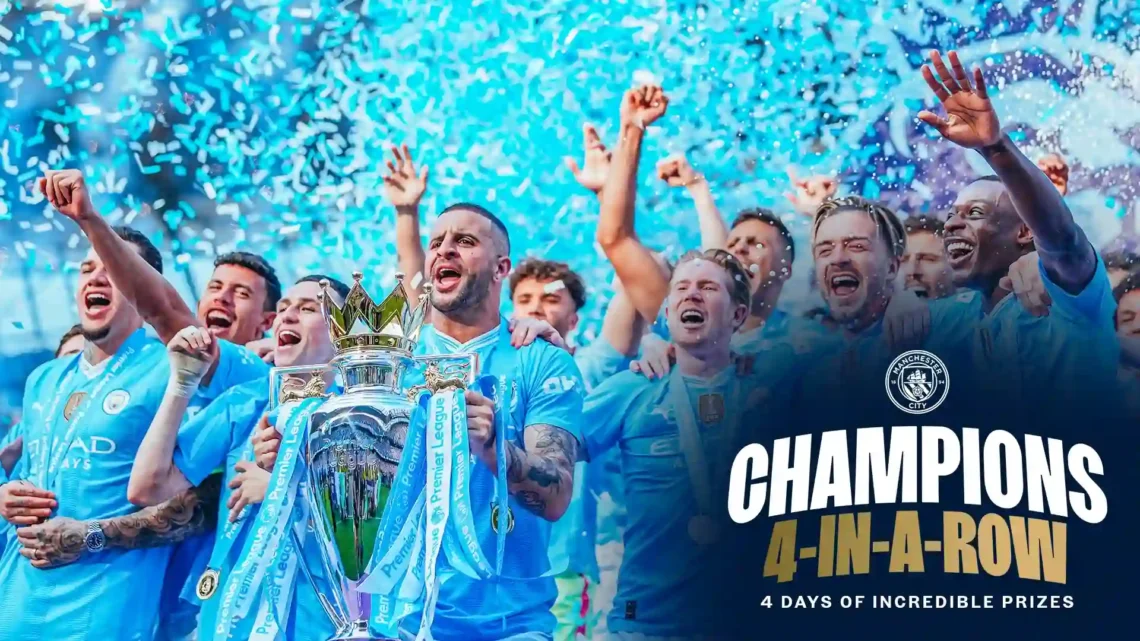
Why Manchester City’s Four-in-a-Row EPL Titles Will Never Be Replicated, Even with Infinite Spending
Manchester City’s unprecedented run of four consecutive English Premier League (EPL) titles from 2020 to 2024 stands as a towering anomaly in English football, a feat often attributed to their financial prowess.
Yet, the notion that limitless spending could replicate this dynasty is a dangerous fallacy, ignoring the unique confluence of managerial genius, structural advantages, regulatory leniency, and competitive timing that fueled City’s dominance.
Trending Now!!:
Using a hypothetical scenario where Liverpool, under Arne Slot, splurges on marquee signings like Florian Wirtz, Alexander Isak, Hugo Ekitike, Jeremie Frimpong, and Milos Kerkez—yet still falters after losing four consecutive matches early in the 2025-26 season—this article argues that no amount of financial investment can recreate City’s feat.
Liverpool’s real-world cautious spending under Slot further underscores the impossibility of matching City’s achievement. The EPL’s evolving landscape, combined with City’s controversial advantages, ensures their four-in-a-row will remain an unrepeatable singularity.
City’s four-title streak was not merely a product of wealth but a meticulously engineered ecosystem. Pep Guardiola, arguably the greatest manager of his generation, orchestrated a squad that combined tactical innovation with relentless consistency.
His ability to evolve City’s playing style—morphing from tiki-taka possession to a hybrid of control and lethal counter-attacks—kept rivals perpetually off-balance. His squad, bolstered by strategic signings like Erling Haaland, Kevin De Bruyne, and Rodri, boasted depth that absorbed injuries and fatigue with ease, allowing City to replace stars with equally capable substitutes.
This depth was a luxury few clubs could afford, a cornerstone of their sustained dominance. Beyond tactics, the most controversial aspect of City’s success lies in their financial practices.
The 115 Financial Fair Play (FFP) charges, still unresolved as of October 2025, suggest a period of financial impunity that allowed City to outspend rivals without immediate repercussions.
This is not to diminish their on-field brilliance but to highlight a critical truth: City’s dominance thrived in a regulatory environment that permitted financial flexibility no longer available, a window that has firmly closed under today’s stricter Profitability and Sustainability Rules (PSR).
Contrast this with Liverpool’s real-world approach under Arne Slot, who took the helm in 2024 following Jürgen Klopp’s departure. Liverpool’s transfer strategy has been notably frugal, with a net spend in the 2024-25 season hovering around £30 million, a fraction of City’s outlays during their title-winning years.
Slot inherited a squad built on Klopp’s high-intensity philosophy but has leaned heavily on existing talent, with minimal additions like Federico Chiesa (£10 million) and a focus on youth integration. This restraint is partly philosophical—Liverpool’s owners, Fenway Sports Group, prioritize sustainability—and partly pragmatic, given the tightening of PSR.
Slot’s Liverpool have shown early promise, sitting atop the EPL table in October 2025 with a blend of tactical pragmatism and attacking flair. However, their lack of spending exposes a stark reality: even a tactically astute manager cannot sustain a four-year title run without significant investment in squad depth.
Liverpool’s current squad, while talented, lacks the bench strength to compete across multiple fronts—Champions League, FA Cup, and League Cup—while maintaining EPL dominance. Injuries to key players like Alisson Becker or Mohamed Salah could derail their campaign, a vulnerability City rarely faced due to their ability to maintain a roster of interchangeable stars.
Now, imagine a hypothetical scenario where Liverpool abandons this prudence for a blockbuster transfer window in 2025, spending £300 million on Florian Wirtz (£80 million, Bayer Leverkusen’s creative genius), Alexander Isak (£70 million, Newcastle’s prolific striker), Hugo Ekitike (£40 million, PSG’s promising forward), Jeremie Frimpong (£50 million, Leverkusen’s dynamic wing-back), and Milos Kerkez (£60 million, Bournemouth’s versatile left-back).
This revamped squad, blending youth and experience, would theoretically position Liverpool as title favorites, capable of matching City’s depth and firepower. Yet, fast-forward to October 2025, and Liverpool, despite this lavish spending, are faltering.
After 10 matches in the 2025-26 season, they sit sixth, having lost four consecutive games—a 2-1 defeat to Crystal Palace, a 2-1 collapse to Chelsea, a 2-1 upset by Manchester United, and a 3-2 thrashing by Brentford. The reasons for this failure expose why City’s four-in-a-row cannot be replicated, even with a blank chequebook.
The argument that increased spending could replicate the City’s feat ignores several insurmountable barriers. First, integration challenges and tactical cohesion undermine even the most ambitious squads. Signing five high-profile players, each with distinct playing styles, creates a logistical nightmare.
Wirtz, a playmaking maestro, demands freedom to roam, clashing with Trent Alexander-Arnold’s creative role from right-back. Isak and Ekitike, both center-forwards, compete for the same position, disrupting squad harmony.
Frimpong’s attacking instincts overlap with Mohamed Salah’s right-wing dominance, while Kerkez struggles to adapt to Slot’s high-pressing system. Unlike City under Guardiola, who seamlessly integrated signings into a well-oiled machine, Liverpool’s new arrivals lack the time to gel.
Slot’s pragmatic, possession-based system, successful with Klopp’s inherited squad, buckles under the pressure of incorporating such diverse talents mid-season. In contrast, City’s signings were carefully curated to fit Guardiola’s vision, a process honed over years.
Second, the EPL’s competitive landscape has shifted dramatically. The introduction of stricter PSR regulations in 2024 limits clubs’ ability to spend recklessly without risking points deductions or transfer bans, as seen with Everton and Nottingham Forest’s penalties in recent seasons.
Liverpool’s hypothetical £300 million splurge, while theoretically possible, would likely trigger PSR breaches, forcing the club to offload key players like Luis Díaz or Trent Alexander-Arnold to balance the books, weakening the squad’s core.
City’s title-winning years coincided with a looser FFP framework, allowing them to amass depth without immediate penalty. Even a club with limitless funds—say, Newcastle United under Saudi ownership—cannot buy their way to four consecutive titles without navigating these regulatory constraints.
City’s alleged FFP breaches—115 charges still pending—suggest a systemic advantage that allowed them to outspend rivals without consequence, a luxury no club can enjoy today. Third, managerial stability is a rare commodity.
Guardiola’s decade-long tenure at City is an outlier in modern football’s hire-and-fire culture. His ability to maintain player motivation and reinvent tactics annually was central to City’s sustained success. Slot, while tactically astute, is in his second season at Liverpool in this hypothetical scenario, still adapting to the Premier League’s intensity.
Managing a squad of superstars with inflated egos—Wirtz’s flair, Isak’s goal-scoring demands, Frimpong’s attacking instincts—requires a level of authority and tactical clarity that even Klopp struggled to sustain against City.
Slot’s failure to win four consecutive games, let alone four titles, underscores the rarity of Guardiola’s longevity and genius. Even in the real world, Slot’s cautious approach faces similar pressures, as Liverpool’s limited spending leaves them vulnerable to injuries and fatigue over a grueling season.
Fourth, the psychological toll of relentless winning cannot be understated. City’s players operated in a bubble of confidence, insulated by Abu Dhabi’s backing and Guardiola’s relentless drive. Liverpool, even with their hypothetical super-squad, face intense scrutiny from fans and media expecting instant success post-Klopp.
Four consecutive losses spark a crisis of confidence, with fans questioning Slot’s tactics and the club’s spending strategy. The pressure to integrate high-profile signings amplifies this, as Wirtz struggles to justify his price tag and Ekitike fails to displace Darwin Núñez. In the real world, Liverpool’s frugal approach risks fan discontent if results falter, a dynamic City rarely contended with during their run, thanks to their controversial financial backing.
Finally, City’s success coincided with a period of relative weakness among rivals. Manchester United were mired in post-Ferguson chaos, Chelsea oscillated between brilliance and dysfunction, and Arsenal’s resurgence came too late.
In 2025, the EPL is a shark tank. Arsenal, under Mikel Arteta, are title contenders with a balanced squad. Newcastle, buoyed by Saudi investment, is a growing force. Tottenham’s attacking flair under Thomas Frank and Manchester United’s revival under a new manager make the league fiercely competitive.
Liverpool’s hypothetical super-squad, despite its talent, cannot dominate a field this crowded, especially with early-season losses exposing vulnerabilities. Even in reality, Slot’s Liverpool face a revitalized Arsenal, a resurgent Tottenham, and an unpredictable Newcastle, making the EPL a more crowded battlefield than during City’s reign.
The most contentious aspect of City’s dominance is their alleged financial impropriety. While unproven, the 115 FFP charges suggest a systemic advantage that allowed City to outspend rivals without immediate consequence.
This is not to say their titles were solely bought—Guardiola’s brilliance and the club’s recruitment strategy were critical—but the ability to operate with financial flexibility gave them an edge no amount of spending can replicate today.
Liverpool, whether constrained by PSR in reality or pushing boundaries in this hypothetical scenario, cannot emulate City’s model. The era of unchecked spending is over, and with it, the possibility of another four-in-a-row.
Manchester City’s four consecutive EPL titles were a product of Pep Guardiola’s tactical mastery, unmatched squad depth, a controversial financial model, and a fleeting moment of regulatory leniency. Liverpool’s real-world restraint under Arne Slot, with minimal spending and reliance on existing talent, underscores the impossibility of sustaining a title run without City’s unique advantages.
Even in a hypothetical world where Liverpool splurges £300 million on Wirtz, Isak, Ekitike, Frimpong, and Kerkez, four consecutive losses early in the 2025-26 season reveal the limits of money alone. Integration challenges, PSR constraints, managerial instability, a hyper-competitive EPL, and psychological pressures ensure that City’s feat cannot be replicated.
Their dynasty was not just a triumph of talent but a product of a controversial, unrepeatable era in football—one that will remain unmatched, no matter how many millions are spent chasing the impossible.



Completely agree that City’s four-peat goes beyond just financial muscle. Pep’s tactical consistency and the club’s structural stability created a perfect storm that money alone can’t buy. Even with endless resources, replicating that level of harmony between players, management, and timing feels almost impossible in today’s hyper-competitive Premier League.